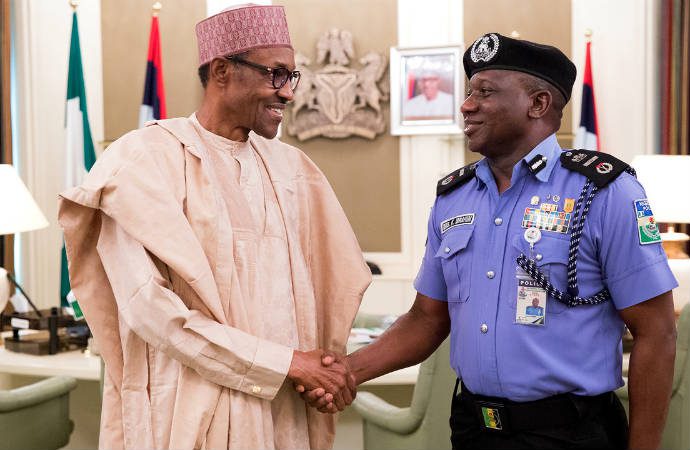Democracy & Governance
The Use of the Police as Contract Enforcers in Nigeria -By Olorunmaiye Joshua


President Buhari and the Acting IGP, Ibrahim Idris
An unfortunate albeit popular trend in the Nigerian society seems to be yet growing and expanding in both popularity and application. Indeed, many a times, one is confronted with stories on the pages of newspapers of how members of the Police are used by their friends, neighbors, relatives, and especially the wealthy, for the enforcement of contracts or for debt recovery; among other civil scores requiring settlement.
Yes, it is usually said, Police is your friend; but how far should this love affair go especially in relation to the definite boundaries set by the law as regards the duties of the Police?
Indeed, many Nigerians assume that for instance, having a friend or an in-law in any of the forces in Nigeria such as the Army, Air Force, the Police or even the local vigilante would afford them a certain high flying status, protection or reckoning. Severally, we hear of members of the society who are engaged in a quarrel or some form of altercation begin to roll out threats like “My Uncle is a DPO, I’ll make sure I deal with you in this town” or “You are lucky my army brother is not around, you would have been dead by now” or even, “If I don’t get my money in three days, be ready to rot in jail”.
Apparently, many people in this country are yet to understand or appreciate the extent of our laws with regards to the difference between criminal and civil matters. This even has less to do with our laws strictly speaking, as general legal knowledge all over the world is that while criminal acts are offences against the state as crimes, civil acts or breaches in contract are not crimes and cannot by any means be treated as such.
One is then required to ask as to what extent the Police can be used in the enforcement of contracts in Nigeria.
In finding answers to this, we would have to look at the statutory functions of the Police, vis-à-vis the difference between civil and criminal matters. More so, there exists the need to take into cognizance the various guiding pronouncements of the Courts in relation to this vexed issue.
Section 4 of the Police Act spells out the general duty of the Police to be the prevention and detection of crime, apprehension of offenders, the preservation of life and property, amongst others. This has been succinctly held has the true position of things by the Supreme Court of Nigeria in the case of Kareem Olatiwo v The State [2013] 8 NWLR (pt 1355 ) 126 at 129.
It is therefore clear from the above provision that the Police are employed by the State and that the duties of the Police are with regards to crimes and security. As a matter of fact, there is nothing in the wording of the Act that contemplates a situation whereby our Policemen are called upon to intervene in civil disputes.
Evidently, the clear demarcation arises in the fact that while the State uses the Police to enforce law and order, contractual matters are solely based on agreements between parties arising out of a promise or a series of exchanged promises that the Courts may enforce.
It therefore suffices that where a dispute arises as to the enforcement of a contract by parties or the performance of a contractual duty owed, resort should be made to the Court by the aggrieved party rather than employing the Police as a war dog for intimidation or coercion.
Indeed, in as far back as 1971, the High Court of Lagos, per Lambo J, in the matter of G. B. Olowu [1971] 2 All NLR 147 at 152 frowned at the use of the Police in enforcing civil claims. The fact in that case was that the Applicant entered into a transaction with a Company for the sale of 10,000 bags of cement which was paid for by the Company. The Company was to take delivery of the goods in Lagos. However, when the goods arrived, the Applicant’s local agents in Lagos sold them to a third party without the Applicant’s knowledge and consent. The Applicant was later arrested and detained.
The Court in hearing the Applicant’s application for a review of the order of detention which had been issued by a Magistrate held among other things that, “I think, in this case, the Kaduna Police had unwittingly allowed their criminal jurisdiction to be used as a weapon for enforcing a civil claim. The Police are not debt collectors for individuals and should, therefore, be wary of those who attempt to use them as such. The Company should have been plainly told to seek redress for the return of their money in a civil Court, or consult a Solicitor for advice in the matter”. The Applicant was thereby discharged.
This position was later restated in the 2010 case of Chief Francis Igwe & Ors v Mr. Goddy Ezeanochie & Ors [2010] 7 NWLR (pt 1192) 61 where the Court of Appeal pointed out that the Police are not and should not in any community of civilized people be used as debt collectors, or in the resolution or settlement of disputes amongst people, as such use of Policemen often leads to the infringement of the fundamental rights of others.
A reaffirmation of this pronouncent was made by the Courts in the case of Mr. Gabriel Jim Jaja v Commissioner of Police & 2 Ors (2013) 6 NWLR (Pt. 1350) 225. Here the Appellant had collected a loan of N700,000.00 from 3rd Respondent to which he was indebted, and was subsequently arrested and detained for. The Court of Appeal held that the Police duties under the law do not enjoin the Police to act as debt collectors. Furthermore, once a transaction is in form of a contract, the Police ought to exercise restraint. Not only were the Police rebuked for its involvement in a civil matter, the Appellant’s release was ordered and costs also awarded against the Police for the Appellant.
As has been held in the case of Ken McClaren v James Jennings [2003] FWLR (pt 154) 528 , such arrest or intervention by the Police, being unauthorized and unjustified by the law is wrongful and illegal. Indeed a person who directs a Policeman to effect such illegal arrests may be liable in tort.
It is hereby submitted that in the event of such disputes, Nigerians should take the matter before a civil Court for adjudication. Indeed, the Courts are the last hope of the common man.
*OLORUNMAIYE JOSHUA is a Legal Practitioner based in Abuja, Nigeria. He is an indigene of Kogi State and can be reached via phone on 08066832517 and email: joshomaiye@gmail.com. He can also be followed on twitter: @joshgiantfeet.


















